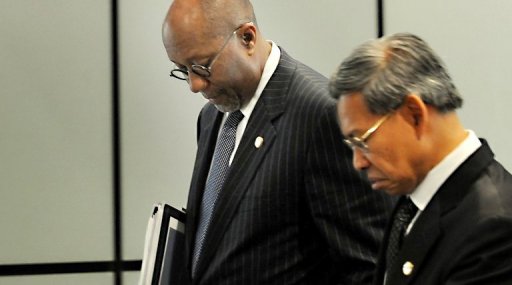US keen for Malaysia to join trade pact

AFP | 7 May 2010
US keen for Malaysia to join trade pact
WASHINGTON — The United States said Thursday it was keen for Malaysia to enter negotiations on a trans-Pacific trade deal after the two countries shelved talks on a bilateral agreement.
US Trade Representative Ron Kirk held talks this week with Malaysian Trade Minister Mustapa Mohamed, who traveled with colleagues from Brunei, Indonesia and Laos to Seattle to promote business opportunities across the Pacific.
Mustapa indicated that Malaysia was interested in exploring the Trans-Pacific Partnership, a once-obscure pact revived by President Barack Obama as other trade deals languish before the US Congress.
"It’s not my place to telegraph what Malaysia would do, but obviously that is an economy that we are very interested in having join," Kirk told a forum in Washington of the East-West Center.
"We’ve been very honest in our outreach to them that we think that having them participate in this process makes a more sellable case to the American public than a stand-alone free trade agreement," Kirk said.
US-Malaysia trade talks had dragged on for eight rounds, bogged down in sensitive areas including Malaysia’s system of affirmative action for Muslim Malays who dominate the multi-racial population.
The countries involved in the Trans-Pacific Partnership talks are Australia, Brunei, Chile, New Zealand, Peru, Singapore, the United States and Vietnam.
Lawmakers from Obama’s Democratic Party have been critical of free trade pacts, fearing that they would hurt US workers.
The previous administration of George W. Bush completed negotiations with South Korea on a free trade pact, but the Congress has yet to act on it with Washington seeking more concessions for US automakers.
Congress has also held up trade agreements with Colombia and Panama.
Obama has promised to South Korean President Lee Myung-Bak to work to move forward the free-trade agreement, which Seoul sees as crucial to improving the competitiveness of a nation situated between giants China and Japan.
But Obama and his congressional allies have set no deadline and the European Union has since signed its own free trade pact with South Korea.
Kirk acknowledged that the Obama administration faced political hurdles to bringing any of the free trade pacts to a vote.
"More important than getting any one deal done is being honest and addressing the underlying, fundamental cynicism that is beginning to creep in" about free trade, Kirk said.
"Too many Americans believe that we’ve gotten cheap T-shirts and cheaper consumer electronics but that we’ve shipped all our jobs overseas," he said.
Arguing that trade benefits the US economy overall, he said: "Those of us who believe in trade owe it to ourselves to honestly sit down and listen" to workers’ concerns.
He acknowledged, however, that "the clock is ticking."
"I want to get this done sooner than later," he said of the South Korea free trade pact. "I don’t want to give the European Union or any other group of businesses any more headstart on America."





